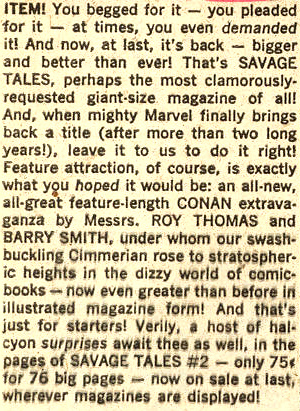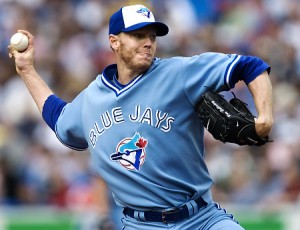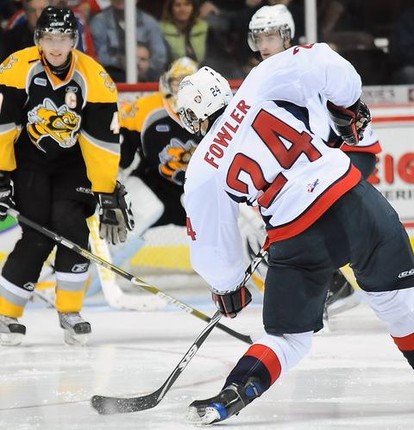Follow Friday – the Twitter Bullpen
Growing up I was fortunate to have access to my dad’s wonderful Silver Age collection of comics. Also, since I grew up in the 90s, I could pick up relatively cheap back issues from the medium’s second golden age, the 1980s.
As a result I’ve been exposed to some of the real magic of Marvel Comics. Obviously, the stories and artwork is the major draw of their library, but one of the really attractive things about these eras was the infamous Bullpen Bulletins.
In short, the Bulletins were a newsletter inserted into all of Marvel’s monthly titles that talked about the comings and goings of their roster of writers, artists and editors.
Really, it was an invention of editor-in-chief Stan Lee to promote new titles and new talent. The Bullpen Bulletins were always over-the-top and Barnum-esque but it was also entertaining and made you feel like you were right there with your favourite creators.
Marvel discontinued the feature in 2001, and I can’t say that I blame them. After all, the Bullpen itself had been dispersed by the advent of digital technology allowing a lot of freelancers to work from home.
Further, today’s creators are able to float between DC Comics, Marvel, Image, Dark Horse and other publishers, meaning that the esprit de corps that was at the heart of the Bulletins was seemingly at an end.
Twitter has rekindled that sense of camaraderie and taken it to the next level. Instead of getting to read monthly highlights of Bullpen sessions, comic book fans can now follow the jabs, jokes and work of all their favourite creators on a minute-by-minute basis.
The queen of the comics Twitter-verse has to be Gail Simone, the writer of Secret Six and Birds of Prey. She is one of the most active Tweeters out there. One of her regular “features” is to antagonize her fellow comic creators and hilarity often ensues.
Warren Ellis is the author of many books and magazine articles, but is also known for his comics work including Transmetropolitan, Nextwave, Planetary and Hellblazer. His Tweets are jovially cantankerous as he playfully abuses his followers.
A more light-hearted creator is Dan Slott, the current scribe of Spider-Man. He also penned a tragically short-lived run on the Mighty Avengers which recently concluded. He often discusses his writing process and things he loves about his job. It’s a fun read.
One of my favourite comic book writers is Kurt Busiek, the author of the brilliant creator-owned Astro City. He’s done a ton of other work for just about every comic publisher you can name. If you’ve never read it, his run on the Avengers with master illustrator George Perez is some of the best comics work ever.
Finally, there’s the duo of Ed Brubaker and Matt Fraction, who have turned the Marvel universe on its ear in the past few years.
Brubaker just finished an incredibly strong run on Daredevil and continues to pen Captain America. Fraction is the current mind behind the X-Men, Thor and the Invincible Iron Man. The two collaborated on the Immortal Iron Fist, a joy to read that ended too soon.
There are myriad other creators on Twitter, but these are a few of my preferred feeds. It’s fun and exciting to see the Bullpen continue on, at least in spirit, in the digital age. If you’re a fan of comics, you should try looking up your favourite writer and artist and get to know them just as Stan Lee once envisioned.
What’s the French for “I was wrong”?
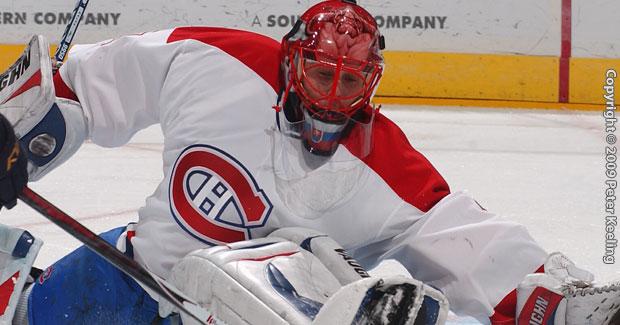 Every morning I try to come up with a new idea to blog about. Sometimes I’ve already been turning an idea over in my head for a day or two, other times I have to spend hours scouring websites and watching various sports channels to try to come up with a good idea.
Every morning I try to come up with a new idea to blog about. Sometimes I’ve already been turning an idea over in my head for a day or two, other times I have to spend hours scouring websites and watching various sports channels to try to come up with a good idea.
The challenge is coming up with an original angle, something to give my readers that is new and different. Often this means avoiding topics that the mainstream media is all over.
But how can I avoid talking about the Montreal Canadiens' incredible 2-1 Game Seven victory over the Washington Capitals last night?
I’m glad that I didn’t commit any kind of National Hockey League post-season because I would have never picked the Habs to better the Capitals. In fact, if anything, I would’ve picked top-seeded Washington to sweep Montreal right out of the playoffs.
I had figured that although the combination of Jose Theodore and Semyon Varlamov has been a shaky goalie-by-committee for the Caps all season, they were no worse than the netminder hydra of Carey Price and Jaroslav Halak.
Surely, Montreal’s pop-gun offence would’ve been no match for the Washington juggernaut. The Canadiens had no corresponding Mike Green. No Nicklas Backstrom or Alexander Semin. And Alex Ovechkin? He was several tiers above any forward the Habs have on their payroll.
Heck, months ago I claimed that general manager Bob Gainey’s sudden departure from the Habs would prove to be a distraction for the seemingly playoff-bound franchise.
Well, I’m not too proud to admit that I was wrong on all counts.
Halak, of course, was money for Montreal in the final games of the series. He stopped just about everything that came his way and stymied the league’s best offence.
Speaking of stopping shots – Hal Gill, Josh Gorges and especially Jaroslav Spacek put their bodies on the line shift after shift, cutting down passing lanes and blocking half of Washington’s chances.
All that defensive effort created tons of opportunities for Mike Cammalleri, Scott Gomez and Brian Gionta. Although all three are often maligned for being relatively short (Gionta is the shortest at 5’7”) they stood tall for the Canadiens and provided a crucial spark for the Habs.
Now Montreal is taking on the Pittsburgh Penguins, the defending Stanley Cup champions, and again they’re big underdogs. I want to count them out again, say that there’s no way that their sound defensive system can create back-to-back upset.
But hey, I’ve been wrong before.
Still rocking my khakis with a cuff and a crease
I’m young enough that my musical tastes, such as they are, really developed in the Age of Napster. Sure, I had one or two tapes and a few dozen CDs, but I really became a fully-formed listener by downloading songs one at a time.
As a result, I’m generally disinterested in the full album experience. I prefer a mix tape over an EP.
However, one of the few exceptions is Dr. Dre’s classic The Chronic: 2001.
Released in 1999, this album was heralded by the hit single “Still D.R.E.” which proudly proclaimed that the former producer of N.W.A. was back and hungry to prove that he was still the best.
A follow-up to 1992’s The Chronic, 2001 has a similar format to its predecessor. All the beats are composed by Dre, with a host of guest appearances from his stable of rapping protégés and occasional appearances by the man himself.
Dre pulled together an impressive roster of friends for this opus: West Coast rap stalwarts Snoop Dogg and Nate Dogg return, along with former N.W.A. member MC Ren. The Chronic: 2001 also introduces younger rappers headlined by Xzibit and Eminem.
“Still D.R.E.” and “Forgot about Dre”, the second single from the album, are indicative of the album’s main theme about the good Doctor’s status in the music industry.
Like the rest of the album, he’s trying to reconcile his reputation, his violent image from a decade ago and the reality of being a multi-millionaire who no longer lives on the infamous streets of Compton, California on these tracks.
As Dre said himself in an interview with the New York Times:
“For the last couple of years, there's been a lot of talk out on the streets about whether or not I can still hold my own, whether or not I'm still good at producing,” he said just before 2001 was released. “That was the ultimate motivation for me. Magazines, word of mouth and rap tabloids were saying I didn't have it any more.”
“What more do I need to do? How many platinum records have I made? O.K., here's the album -- now what do you have to say?”
In the same interview he explains how he saw the unfolding of the album to be like a movie following a plotline.
That story arch is apparent from the very first track “Lolo” when Xzibit and Tray-Dee are shocked to see Dr. Dre appear at a local hangout in a brand new lowered car.
The second track is a soliloquy by Dre called “the Watcher” about all the things he’s seen in his career. The next four tracks follow a similar subject, with Dre and some of his older associates reminding the listener of their past exploits and successes.
“What’s the Difference” serves as a turning point in the album, as rookies Xzibit and Eminem take up Dre’s cause and talk about how he’s shaped their careers.
Once he’s re-established himself as a force in the music industry again, the rest of the album talks about moving forward (“The Next Episode”) and revelling in all of Dre’s new success.
No one can doubt Dr. Dre’s chops as a producer. He’s proven himself time and time again. But the Chronic: 2001 should be admired not just for its music but the clever way he uses lyrics and guest appearances to express his frustration with all of the premature claims of his decease as a viable music artist.
It’s a creative use of rap’s braggadocio lyrical style that can be enjoyed again and again.
You’re bringing me down, ARod
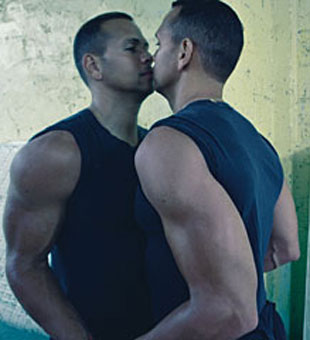
This photo of Alex Rodriguez has nothing to do with Thursday's game against the Oakland Athletics. It's just funny.
Yesterday I tried to be sunny and say three nice things about Major League Baseball. It took less than 24 hours for Alex Rodriguez to bring me back down with his bush league play.
In case you missed it, Yahoo Sports’ Big League Stew summed it up well:
“In the sixth inning of the A's 4-2 victory, Rodriguez went from first to third on a foul ball by Robinson Cano. His trip back to first took him right over the pitcher's mound, an unspoken no-no that ticked [starting pitcher Dallas] Braden off right away.
After a double play ended the inning, the 26-year-old pitcher immediately started yelling at A-Rod — watch it here — who claimed he didn't know he had done anything wrong.”
This isn’t the first time that ARod has broken one of baseball’s unwritten codes. We’ll ignore his admitted steroid use and focus on his transgressions against the game’s etiquette.
My first exposure to Rodriguez’s classless brand of play was during the infamous 2004 American League Championship Series with his New York Yankees leading the series against the Boston Red Sox 3-0. On a routine groundout to the pitcher ARod decided to chop the ball out of Bronson Arroyo’s hand. After some deliberation the umpires ruled him out.
It became a turning point in the series with the Red Sox rallying to an improbable seven-game series victory.
Three seasons later, Rodriguez got into the same kind of shenanigans at Toronto’s Rogers Centre. During an infield fly Rodriguez, circling rounding third, yelled right behind the rookie infielder who had called for the ball. Believing that he was being called off by another Blue Jay, the fielder let the ball fall harmlessly to the ground, allowing the Yankees to score.
Asked about the incident, ARod claimed that he had only yelled in celebration.
My problem with ARod isn’t so much what he does, but how he handles the ensuing criticism. He refuses to accept responsibility.
I don’t mind there being a heel in baseball. In fact, I think it’s one of the best things about Barry Bonds’ entire career. I didn’t like the former Giants slugger, but I could at least admire his willingness to be the villain.
Instead, of Bonds’ unique sense of personal responsibility, we get Rodriguez saying this in reaction to Braden’s blow-up: “He just told me to get off his mound. I was a little surprised. I'd never quite heard that. Especially from a guy that has a handful of wins in his career ... I thought it was pretty funny actually.”
I see ARod’s flaunting of baseball’s social conventions as something akin to taking a run at a goaltender in hockey or flagrantly fouling a star player in basketball. You can do it, but don’t act surprised when they’re upset.
Don’t dismiss their complaints because you have a higher batting average or get more lucrative endorsement deals. Appreciate that if you lack respect for your opponents they’re going to disrespect you. Expect some sort of retribution and take your lumps.
Let’s try a little positivity…
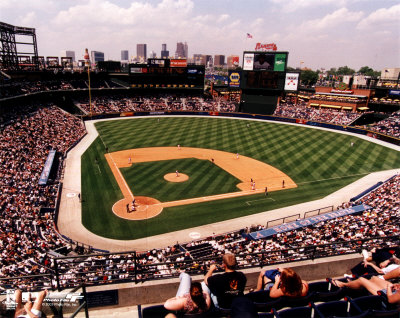
One of the things I love about baseball is the relaxing atmosphere of afternoon games, particularly when broadcast from Turner Field on Peachtree TV.
I’m reading Sports Illustrated’s Great Baseball Writing and I’ve learned something from the various essays and articles in the volume – the great American pastime is always in a state of hand-wringing about the State of the Game.
Think about it. At the turn of the 20th century there was great concern over the hoodlums who played the game. The 20s were marred by gambling scandals, primarily the one revolving around the Chicago White Sox and the 1919 World Series. After that was World War II, segregation, integration, labour strife and, most recently, steroids.
There’s always a new problem plaguing the sport.
In all that doom and gloom there isn’t enough talk about what makes baseball great. I’m as guilty of this pessimism as the next person. This season alone I’ve taken shots at my hometown Toronto Blue Jays, complained about lengthy games and weighed-in on Joe Cowley and talk of moving the Jays.
So let’s get positive. Let’s talk about three things that I love about baseball.
1) Afternoon Games
Nobody likes to work during the summer. It’s a drag. Everyone would much rather be outside, enjoying the sun. Unfortunately, employment is a necessary element of being a part of today’s society.
However, baseball matinees can provide some respite from the drudgery of work. Following the game on the radio, on TV or on the Internet is always a pleasant distraction from a job.
A particular favourite of mine is to follow the Atlanta Braves on Peachtree. Their announcers are laid back and the fans at Turner Field are great. It’s always relaxing and fun to watch.
2) Tradition
I really enjoy the little social behaviours that surround baseball games. Waiting for the half inning to return to your seat after a trip to the concession stand. Judging a person’s character based on whether or not they use the real pitcher’s rubber during the opening pitch. Singing, stretching and dancing during the seventh inning stretch. They’re all good.
A particular favourite is the habit of Torontonians to boo any opposing team that dares to have a mound meeting or try to pick-off a runner. No matter what the situation, Jays fans go nuts at the very thought of another team trying to invoke strategy.
3) The Fans
Baseball fans can’t compete with other sports’ supporters in terms of passion or intensity, but they are definitely smarter. Hockey fans, as much as I love ‘em, are basically only capable of three sounds – boo, cheer and Go <team name> Go! The rest of the game is spent in a fixed state of concentration. Football and basketball fans are much the same.
However, baseball fans sing songs together, come up with chants, and best of all heckle. No matter where they’re sitting in a stadium they will yell at the top of their lungs lengthy diatribes on their target’s short-comings as a player.
Their knowledge of bench players and opposing teams runs deep too, with many fans citing the personal lives of the athlete. Remember when it was rumoured that Alex Rodrgiuez was stepping out on his wife with Madonna? Good times. Truly, a golden age of heckling.
Tempest in a tea pot: thoughts on the Joe Cowley controversy
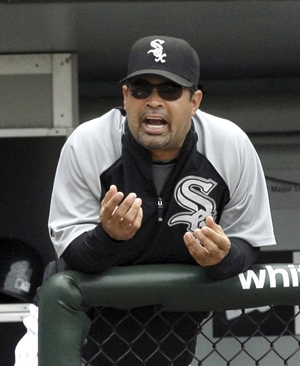
Chicago White Sox manager Ozzie Guillen was the voice of reason in the Joe Cowley controversy? Weird.
Last Thursday the Toronto sports blogosphere was aflame with controversy over a web article written by Chicaco Sun-Times beat reporter Joe Cowley titled “No, Canada, for MLB”. In short, it was about how the Blue Jays are a moribund franchise that should be moved.
As a Torontonian - born and bred -I had a very strong, knee-jerk reaction to reading this. After all, who is this guy? I don’t know him from Adam. Doesn’t he know that we’re the centre of the universe?
Reading Cowley’s Wikipedia profile did little to mitigate my rage. I mean, who wouldn’t be inflamed when he “protests” Canada by refusing to stand during the national anthem? The two incidents make him appear ignorant and ethno-centric.
However, after a day or two of reflection I calmed down. After all, Cowley clearly didn’t know what he was talking about. He was probably just trying to get a reaction from loyal Blue Jays fans.
This morning, Cowley appeared on the Fan 590’s Big Early with Don Landry and Gord Stelleck where he defended himself admirably, pointing out that his infamous remark that Toronto was “nothing but a city in a third-world country” was taken out of context.
However, Cowley stuck to his guns and reiterated his belief that the Blue Jays should be moved. He re-stated his beliefs that Venezuela deserves a team and that, aside from political reasons, it would work in Caracas, the capital of the country.
Cowley had addressed this idea in his article, with supporting quotes from White Sox manager Ozzie Guillen and pitcher Freddy Garcia. Both Venezuelans spoke about how popular a team would be in Caracas.
That’s entirely fair comment. It would be popular. Economically viable? No. Politically possible? No. Safe? Not even a little. But boy, there would be crowds.
Ask any Winnipeg Jets supporter – drawing a crowd isn’t enough. You need the backing of a strong business community. Caracas lacks that kind of legitimate financial support.
Also, let’s consider who he asked – two proud nationalists who, as fans, would undoubtedly love to see a major league team in their country. I can entirely sympathize. As a Canadian I love having a Major League Baseball franchise in my country, and am sorry that Montreal lost the Expos.
Hell, if my heart had its way every major Canadian city would be represented in the National Hockey League and MLB. It just isn’t a realistic desire.
It’s worth noting that neither Guillen or Garcia said that the Jays should be moved there or that the Toronto franchise should be moved at all. They just said that they’d like a team in Venezuela.
Guillen did speak about how the dwindling fan support, compared to the Jays dynasty of the early 1990s, is a sad state of affairs. Again, I agree. It is sad. But the White Sox manager never explicitly said that the team should be folded or relocated. He was just commenting on the rather pathetic attendance figures.
As for Rios’ and his claim that “There's that small group of diehards, but it’s hockey, hockey, hockey. It’s gotten sad here. They just don’t really care.” It’s hard to believe that he doesn’t have some resentment toward Toronto after he was put on waivers by the Blue Jays last season.
Jays fans certainly don’t like him: he had been booed during each of his at-bats over the course of the four-game series.
At the end of the day, I think Cowley’s article reads like a combination of someone with an agenda to push and someone looking for some cheap heat, trying to get a rise out of a beleaguered fan base to generate some hits for his web presence.
In all honesty, I’m sorry to have wasted 639 words on this “news”. Cowley’s already gotten enough attention for his ill-considered article.
Busy week ahead…
This is going to be a crazy week here at JCH.com headquarters. In addition to my usual self-imposed blogging duties I’m working on an exciting freelance project for the Canadian Sports Hall of Fame.
Specifically, I’m doing brief profiles of honoured members Lionel Conacher, Angela James and Jacques Plante. My writing will be part of the displays at the new Hall of Fame that’s being built in Calgary’s Olympic Park.
In any event, I’ll try to keep the content coming in this space, but there is a good chance that I’ll miss a day or two this week.
